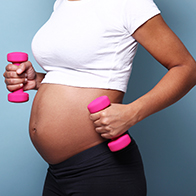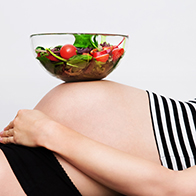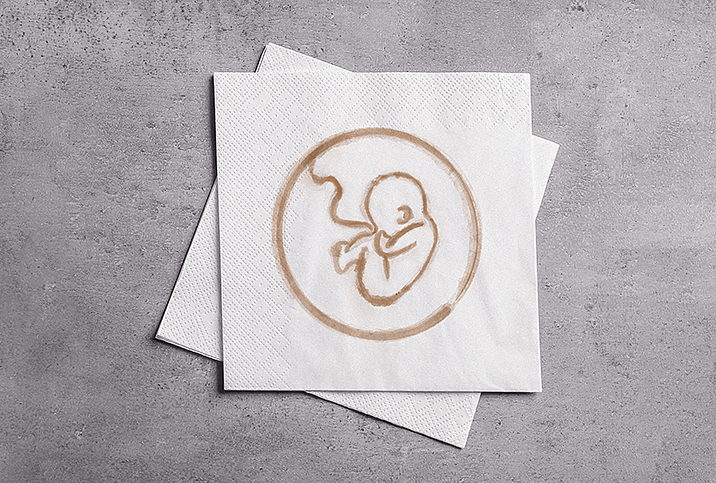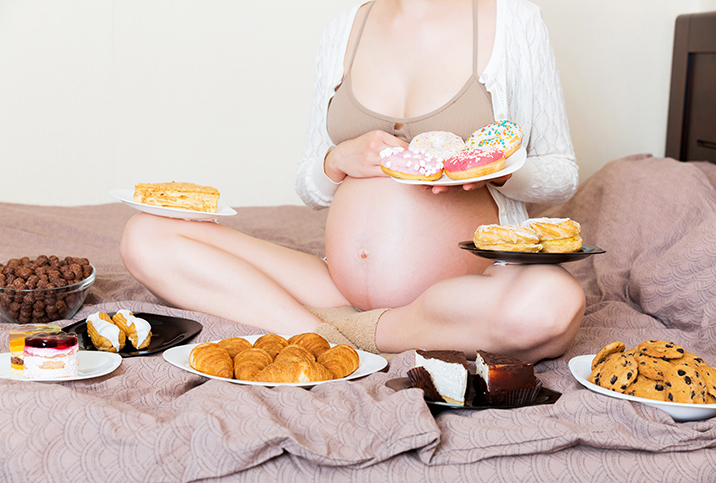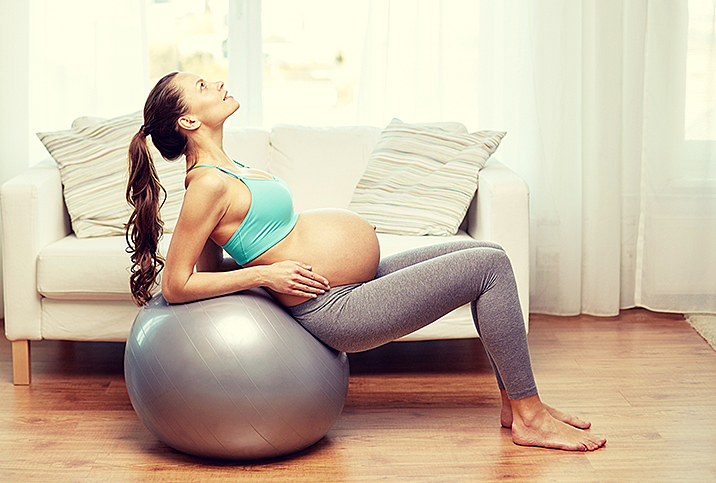Change Up Your Chores During Pregnancy
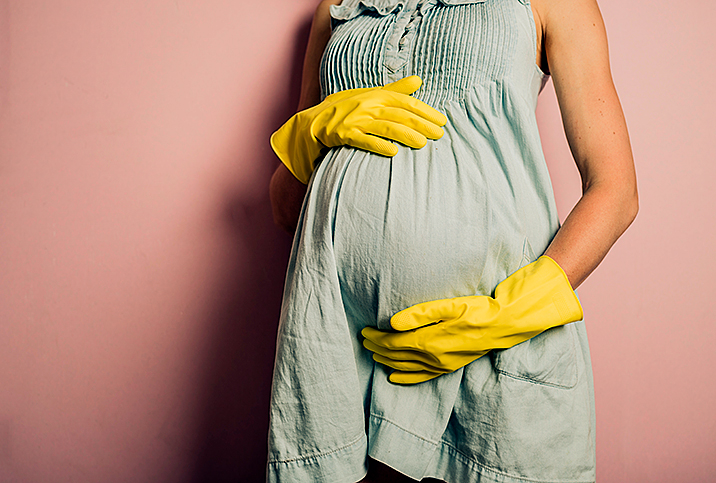
When it comes to health and safety during pregnancy, some of the typical daily chores and routines you had before becoming pregnant need to be adapted. We spoke to medical experts for a breakdown of which tasks are better avoided.
Some types of relatively safe chores for those who aren't pregnant can become a real risk to the health of the pregnant person and growing baby. The dangers posed by certain chemicals, physical activities, and bacteria, viruses or parasites can lead to serious medical complications.
Although there are several chores that every pregnant person should avoid, others depend on your circumstances and medical conditions. In some cases, this is due to the physical changes that a person goes through during pregnancy, and in other instances, the risks are to the fetus. Speak to your doctor if you have any questions or concerns about specific activities.
Heavy lifting
While carrying weighty objects up and down the stairs may have been typical before, heavy lifting is a no-go during pregnancy.
"I was able to adapt a lot of chores at work to suit my capabilities. This was simply a matter of breaking chores down into smaller, incremental tasks," explained Dani Davidson, mother of three. "Instead of moving heavy boxes, I would unpack them to lighten the load or utilize trolleys that I would typically have disregarded."
When she moved 32 weeks into her pregnancy, she had to plan ahead to avoid the dangers. "I started packing three months before the move to avoid the mad rush come time for the actual moving day. When it came to unpacking, I just reminded myself that the boxes didn't need to be unpacked overnight. Regular breaks, lots of water (and snacks), and speaking kindly to myself got me through. It wasn't ideal, however, everything got put away eventually," Davidson said.
When it came to unpacking, I just reminded myself that the boxes didn't need to be unpacked overnight.
During pregnancy, the body makes changes to accommodate the growing baby and expanding uterus. One of these changes includes a boost of a hormone produced by the ovaries and placenta called relaxin—so named because it helps to relax the joints and ligaments in a necessary process that allows for the pelvis to widen.
Heavy lifting can increase a woman's chance of preterm labor. This is also not recommended if a woman has certain complications in their pregnancy, such as a shortened cervix or placenta previa," said Christina Gabel, Chief Certified Nurse Midwife, Providence Mission Hospital.
Not all lifting has to be avoided during pregnancy, however. "Normal everyday physical activities aren't a cause for concern. Moderate exercise during pregnancy with your provider's approval can help promote a healthy pregnancy," Gabel said.
Prolonged standing and bending
Many types of chores or workplace duties require bending or sustained standing in place. Think cooking, washing dishes, teaching, child care, packing or stocking shelves, and so on. While a typical bout of dishes that takes about 20 minutes is acceptable for most pregnant people, you could be putting yourself at risk if you spend extended periods on your feet.
"Standing for long periods or bending a lot during pregnancy can increase a woman's chance for preterm labor and birth, or injury during pregnancy," Gabel warned.
Speak to your doctor and employer about your concerns. "It is best to discuss with a provider the amount of lifting, standing, and bending that is appropriate for any individual woman. If possible, ask for help or obtain work restrictions," Gabel advised.
Cat litter
Exposure to toxoplasmosis, a parasite found in cat feces, is a concern in pregnancy. "It is important to understand that cat litter boxes are not the only way women are exposed to toxoplasmosis. Most indoor-only cats will not become infected with toxoplasmosis," Gabel stated.
To avoid exposure to this parasite, Gabel recommended the following:
- If possible, you should not change the cat litter box and avoid contact with cat feces. Ideally, another household member should change the box.
- If you need to change the litter box, you should wear gloves and wash your hands immediately after.
- You should clean the cat litter box daily.
- Wear gloves when gardening or working in soil or sand, as it may contain cat feces from outdoor neighbor cats.
- Avoid handling or ingesting raw meat.
- You should wash any food from the garden thoroughly.
- Wash your hands before handling or eating food.
- Do not feed the cat raw meat during pregnancy.
- Keep your cat indoors.
- Cover your children's sandbox, if applicable.
Toxic chemical exposure
Research on exposure to toxic chemicals during pregnancy is somewhat inconclusive. According to the March of Dimes, the cause of about 70 percent of congenital disabilities is unknown. "Most known disabilities are due to genetic or other unpreventable causes, not a pregnant person's exposure to toxic chemicals, foods, drugs, or infections," Gabel said.
Substances that can cause congenital disabilities are called teratogens. "Exposure to them does not automatically put the baby at risk," Gabel explained. "The type and length of exposure, as well as the stage of the pregnancy at the time of exposure, can come into play."
Studies suggest prenatal exposure to pesticides can harm fetal brain development. If you must work with household cleaners, ensure the area is well-ventilated and limit your time exposed. If possible, opt for natural cleaning products.
Dani Davidson faced this challenge when she became pregnant. Because she worked with toxic chemicals, she had to make some alterations to her typical workday.
"I worked in an environment that had critical hygiene practices," she explained. "Certain hazardous cleaning products were required to be used to ensure the standards were adhered to. Ventilation masks were available. However, I struggled to breathe efficiently during all my pregnancies without a mask, let alone with one."
Limiting her time working with the chemicals or in the mask was vital. She relied on her co-workers to keep her on track. "I was very fortunate to work with an amazing team of ladies who were always willing to assist me when needed—and to put me in my place when they could see I was pushing myself too far," she said.
"At home, I had swapped a lot of cleaning chemicals for microfiber and eco-friendly natural cleaners," she added. "Still to this day, the only harsh chemical I use in the house is toilet cleaner—I can't let that one go."
The takeaway
Protecting yourself and your baby during pregnancy can seem daunting, but with a few tweaks to your daily routine, you can avoid and delegate chores for your safety. If you become overwhelmed with limitations you aren't used to, remember it's only temporary.
Ask for help when you need it, and be open and direct with your employer and partner regarding the support and accommodations you need.







